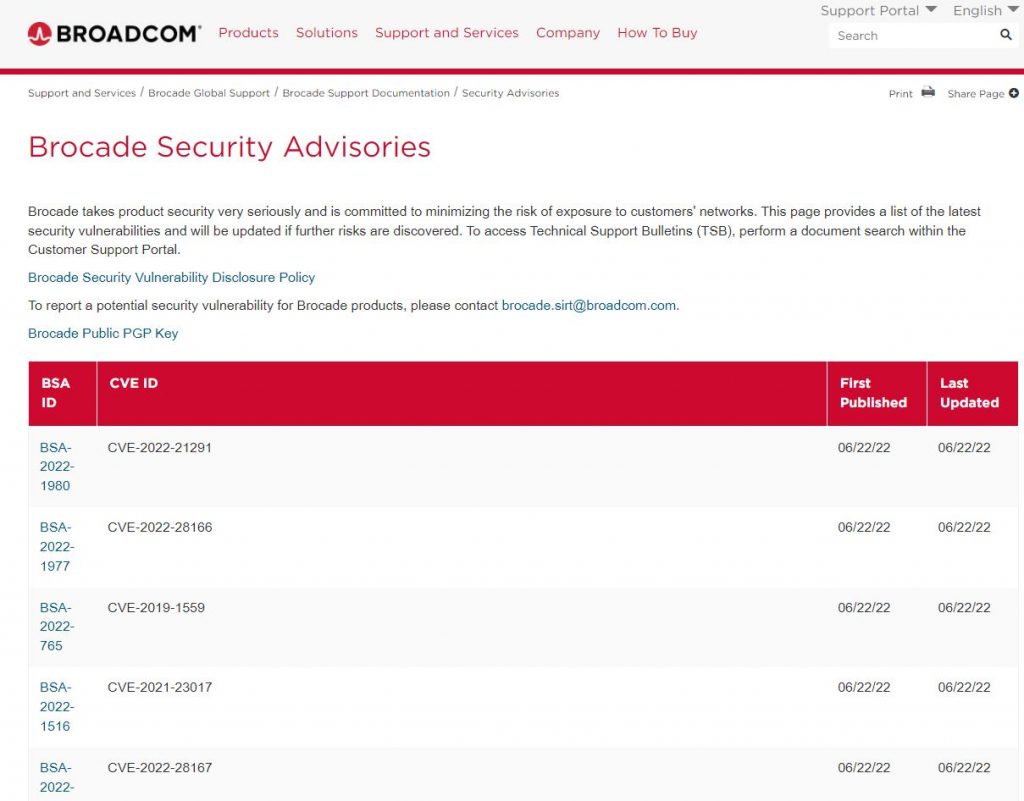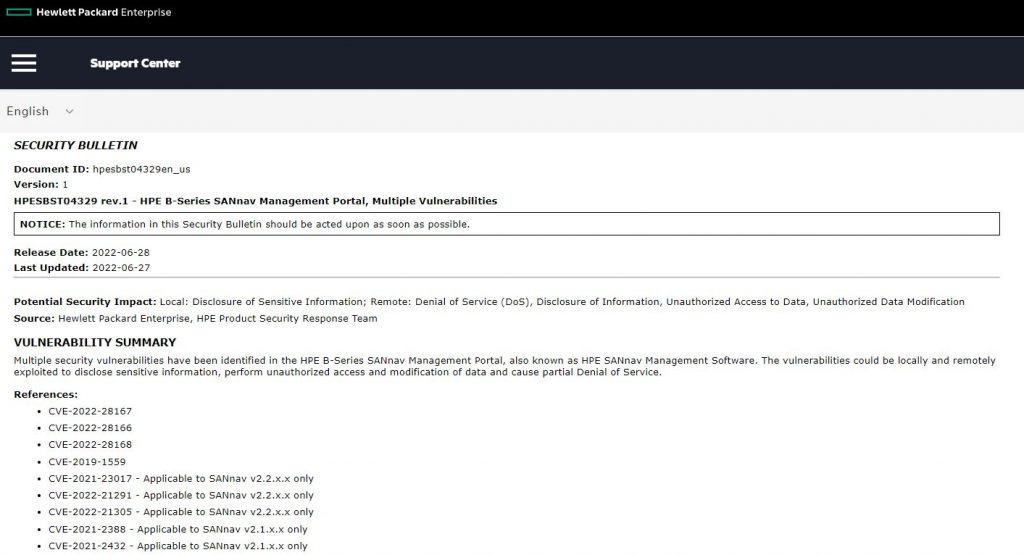Broadcom published that software used by its storage networking company Brocade is affected by 9 important vulnerabilities, and the same vulnerabilities impact the SAN products of several major companies like Dell, Fujitsu, HP, Huawei, IBM, and Lenovo.

The SANnav storage area network (SAN) management application is affected by nine vulnerabilities. Brocade has made available patches but other companies are working over it.
Six of these vulnerabilities have been rated “medium severity” or “low severity”. Exploitation of these vulnerabilities allow manipulate data, decrypt data, and cause a denial of service (DoS) attacks. The remaining three vulnerabilities have been assigned a “high” severity and risk impact rating. They can allow leaking server passwords from log files, and intercept potentially sensitive information due to static key ciphers.
CVE-2022-28167
Brocade SANnav before Brocade SANvav v. 2.2.0.2 and Brocade SANanv v.2.1.1.8 logs the Brocade Fabric OS switch password in plain text in asyncjobscheduler-manager.log
CVE-2022-28166
In Brocade SANnav version before SANN2.2.0.2 and Brocade SANNav before 2.1.1.8, the implementation of TLS/SSL Server Supports the Use of Static Key Ciphers (ssl-static-key-ciphers) on ports 443 & 18082.
CVE-2022-28168
In Brocade SANnav before Brocade SANnav v2.2.0.2 and Brocade SANnav2.1.1.8, encoded scp-server passwords are stored using Base64 encoding, which could allow an attacker able to access log files to easily decode the passwords.
CVE-2019-1559
If an application encounters a fatal protocol error and then calls SSL_shutdown() twice (once to send a close_notify, and once to receive one) then OpenSSL can respond differently to the calling application if a 0 byte record is received with invalid padding compared to if a 0 byte record is received with an invalid MAC. If the application then behaves differently based on that in a way that is detectable to the remote peer, then this amounts to a padding oracle that could be used to decrypt data. In order for this to be exploitable “non-stitched” ciphersuites must be in use. Stitched ciphersuites are optimized implementations of certain commonly used ciphersuites. Also the application must call SSL_shutdown() twice even if a protocol error has occurred (applications should not do this but some do anyway).
CVE-2021-23017
A security issue in nginx resolver was identified, which might allow an attacker who is able to forge UDP packets from the DNS server to cause 1-byte memory overwrite, resulting in worker process crash or potential other impact.
CVE-2022-21291
Vulnerability in the Oracle Java SE, Oracle GraalVM Enterprise Edition product of Oracle Java SE (component: Hotspot). Supported versions that are affected are Oracle Java SE: 7u321, 8u311, 11.0.13, 17.01; Oracle GraalVM Enterprise Edition: 20.3.4 and 21.3.0. Easily exploitable vulnerability allows unauthenticated attacker with network access via multiple protocols to compromise Oracle Java SE, Oracle GraalVM Enterprise Edition. Successful attacks of this vulnerability can result in unauthorized update, insert or delete access to some of Oracle Java SE, Oracle GraalVM Enterprise Edition accessible data. Note: This vulnerability applies to Java deployments, typically in clients running sandboxed Java Web Start applications or sandboxed Java applets, that load and run untrusted code (e.g., code that comes from the internet) and rely on the Java sandbox for security. This vulnerability can also be exploited by using APIs in the specified Component, e.g., through a web service which supplies data to the APIs.
CVE-2022-21305
Vulnerability in the Oracle Java SE, Oracle GraalVM Enterprise Edition product of Oracle Java SE (component: Hotspot). Supported versions that are affected are Oracle Java SE: 7u321, 8u311, 11.0.13, 17.01; Oracle GraalVM Enterprise Edition: 20.3.4 and 21.3.0. Easily exploitable vulnerability allows unauthenticated attacker with network access via multiple protocols to compromise Oracle Java SE, Oracle GraalVM Enterprise Edition. Successful attacks of this vulnerability can result in unauthorized update, insert or delete access to some of Oracle Java SE, Oracle GraalVM Enterprise Edition accessible data. Note: This vulnerability applies to Java deployments, typically in clients running sandboxed Java Web Start applications or sandboxed Java applets, that load and run untrusted code (e.g., code that comes from the internet) and rely on the Java sandbox for security. This vulnerability can also be exploited by using APIs in the specified Component, e.g., through a web service which supplies data to the APIs.
CVE-2021-2388
Vulnerability in the Java SE, Oracle GraalVM Enterprise Edition product of Oracle Java SE (component: Hotspot). Supported versions that are affected are Java SE: 8u291, 11.0.11, 16.0.1; Oracle GraalVM Enterprise Edition: 20.3.2 and 21.1.0. Difficult to exploit vulnerability allows unauthenticated attacker with network access via multiple protocols to compromise Java SE, Oracle GraalVM Enterprise Edition. Successful attacks require human interaction from a person other than the attacker. Successful attacks of this vulnerability can result in takeover of Java SE, Oracle GraalVM Enterprise Edition. Note: This vulnerability applies to Java deployments, typically in clients running sandboxed Java Web Start applications or sandboxed Java applets, that load and run untrusted code (e.g., code that comes from the internet) and rely on the Java sandbox for security. This vulnerability does not apply to Java deployments, typically in servers, that load and run only trusted code (e.g., code installed by an administrator.
CVE-2021-2432
Vulnerability in the Java SE product of Oracle Java SE (component: JNDI). The supported version that is affected is Java SE: 7u301. Difficult to exploit vulnerability allows unauthenticated attacker with network access via multiple protocols to compromise Java SE. Successful attacks of this vulnerability can result in unauthorized ability to cause a partial denial of service (partial DOS) of Java SE. Note: This vulnerability applies to Java deployments, typically in clients running sandboxed Java Web Start applications or sandboxed Java applets, that load and run untrusted code (e.g., code that comes from the internet) and rely on the Java sandbox for security. This vulnerability can also be exploited by using APIs in the specified Component, e.g., through a web service which supplies data to the APIs.


Cyber Security Specialist with 18+ years of industry experience . Worked on the projects with AT&T, Citrix, Google, Conexant, IPolicy Networks (Tech Mahindra) and HFCL. Constantly keeping world update on the happening in Cyber Security Area.










